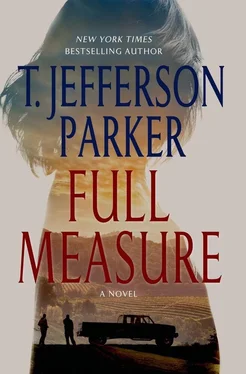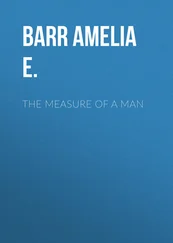“I just flat-out disagree,” said Salimony. “We kicked ass, made a difference, and made our country safer. It’s as simple as that.”
“I’m with him,” said Messina.
Patrick shrugged. “Either way, John Bostik was a great guy and I’ll remember him forever. I looked up to him.”
“Amen,” said Salimony and Janet Bostik in unison. Patrick handed Bostik’s dog tags to his father.
They set out for home. Patrick steered his truck through the looming redwoods, which even near noon permitted little sunlight into the world. The rain had stopped and tufts of fog snagged in the treetops. This place made Patrick feel sullen and nervy, and he saw why John and Kirk wanted out. At least in Afghanistan there was sun. He pictured Boss the last time he’d seen him, then quickly banished that horror.
Messina demanded they see Pelican Bay Prison because he’d heard about it in a movie. So Patrick found Lake Earl Drive and followed it out. “The prison’s got a special cell block, right in the middle,” Messina said. “It drives you insane if they lock you in it too long. The cells are concrete cages with no windows.” Patrick pulled onto the grounds which, upon first sight, looked tranquil and parklike. The parking lot was very large and only one-third full. Behind the electric fences stood the prison, which to Patrick looked efficient and not quite humane. “My old man took me to Joplin Prison when I was a kid,” said Messina. “On account of I’d been doing some shoplifting. Just candy and football cards and stuff but he wanted me to see what was waiting for me. It pretty much worked. Except ever since I’ve been kind of fascinated by prisons. Well, that’s good enough — I doubt they give tours.”
They pulled out of the Pelican Bay parking lot in silence. Patrick followed the signs for the highway. Salimony got the sudden inspiration to visit Sergeant Pendejo’s family, too. He remembered that Pendejo had lived in Coalinga, where the big-ass earthquake happened a long time ago, and which was right on the way to home. “I mean, if we could tell Boss’s family what a great guy he was, we could tell Pendejo’s.”
“But he wasn’t a great guy,” said Messina. “And his name wasn’t even Pendejo.”
“It wasn’t?”
“No, pendejo means pubic hair in Spanish.”
“I always wondered why his tag said something else.”
“Pendejo was just a nickname, Salimony. You never knew that?”
“Pendejo’s name was Alejandro Reyes,” said Patrick.
“So it rhymed with pendejo,” said Salimony.
“Kind of not very much,” said Patrick. “He wasn’t bad. I always thought, down inside that guy who always did every damned thing he was told to do, was an okay human being. He wasn’t mean enough to be a Marine. But he was terrific on that barbecue. He made the thing out of a fuel drum, remember?”
“He died making burritos for his men,” said Salimony. “So let’s go see his family and tell them he wasn’t such a bad guy.”
“Oh, they’re going to love hearing he wasn’t so bad,” said Messina. “Sal? You really are full of shit. Maybe we could get some beers for the road.”
“It’s way past noon,” said Salimony.
Heading south they played the radio and threw empties out the windows and stopped at rest areas. Patrick quit after two beers but the rest of the twelver was gone before Patterson. The two other Marines fell silent then asleep. After six hours on the road Patrick pulled off for Coalinga. The evening was warm in the central valley and the land lay flat. He saw late-season cotton still in the fields but most of the soil was brown and groomed and ready to be planted. He saw the sign for the prison and the sign for the mental hospital then Messina’s head pop up from the crew cab into the rearview. “How come they got so many criminals and crazies in this state?” he asked. “That’s the third prison since Pelican Bay and I been asleep for three hours.”
“Any of those cheese things left?” asked Patrick.
Messina held the bag upside down and nothing but orange dust came out. Next to Patrick, Salimony finally sat up, yawned loudly, and burped. He took out his phone. A moment later he was leaving messages and talking to people, trying to track down the family of Alejandro Reyes.
Finally Salimony got Alejandro’s mother, who gave him Alejandro’s father, who gave him directions. Patrick drove to a convenience store and they bought a cold twelve-pack and three bags of expensive jerky and one artificial rose — pink, unrealistic, wrapped in a clear plastic cone and heavily scented.
The Reyes home was a travel trailer in a row of other trailers, all lined up for shade along a windbreak of drooping greasewood and oleander on the edge of a cotton field. Behind the windbreak was an irrigation canal. As he approached, Patrick saw that the trailers were old and faded, their shapes softened by weather and time. There were big air conditioners dripping water, some resting on wooden decks in front of the trailers, and some propped up on concrete blocks. Between the coaches, vehicles were nosed into the shade of the windbreak too, and they were older and dusty and some had folding sunscreens over the dashboards. He saw laundry drying on lines and children playing stickball and others sitting on upended wooden produce boxes in front of a TV that someone had set up under a portable shade screen. The sun hit the TV screen so brightly Patrick couldn’t make out what they were watching. He saw a group of five or six young men, wiry in their singlets, heavily tattooed, drinking beer and eyeing him. “Pendejo wasn’t exactly from Beverly Hills,” said Salimony.
“This was your idea,” said Messina.
“Who cares where he came from?” asked Patrick. “The aqua-colored trailer, right? Here it is, so let’s do this thing.”
They stood on the spacious deck and Patrick knocked on the door. He heard the roar of the big air conditioner sitting on bricks beside the aqua trailer. Overhead was a slatted roof intertwined with vines with fragrant white flowers. The deck had colorful pots of bougainvillea and geraniums and canna lilies. There were two barbecues and a fire pit made with the perforated canister of a clothes dryer.
A man pushed open the door and stood in the doorway. He was dark and slender, maybe fifty, Patrick guessed, with a weathered face and thick gray hair. He wore a white yoked cowboy-style shirt tucked into clean pressed jeans, and work boots.
“We served with Alejandro,” said Patrick. “We just wanted to tell you he was a good man.”
“I am Raydel, his father. It’s too small in here. Wait, please.” Raydel pulled the door shut and a few minutes later he came outside followed by a thin dark woman. She had black hair and wore a light blue dress and she smiled without looking at the young men. She carried two white resin chairs from inside and Raydel set out three more from the stack on the deck. He introduced his wife as Theresa. She went back into the trailer and returned with a framed portrait of Sergeant Reyes in his dress blues. She set it on the railing of the deck, facing them. Pendejo looked proud and happy. He was not a hard man.
They sat in the shade and Salimony gave everyone a beer, and the rose to Alejandro’s mother, and he opened the jerky and passed the bag. “He hated the rations,” said Salimony. “Alejandro got those packages from you, with the spices and dried chilies and those weird pickled carrots you Mexicans eat. And he’d mix them with field rations and come up with real food. He was the best cooker in the whole battalion. I think you should know that he was doing something he liked when he died. He was cooking for us jarheads. Standing right out there by a barbecue he’d made all by himself. He was brave.”
Читать дальше












